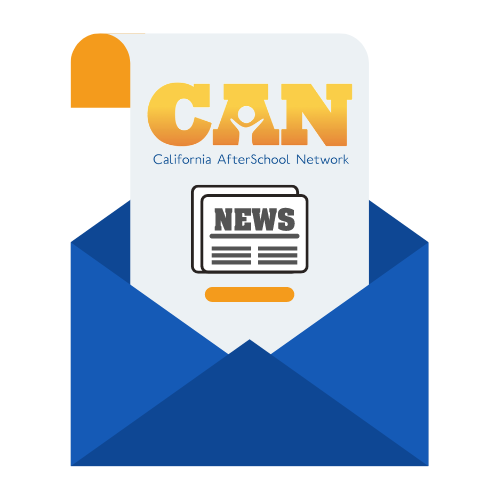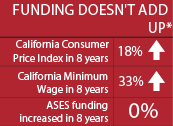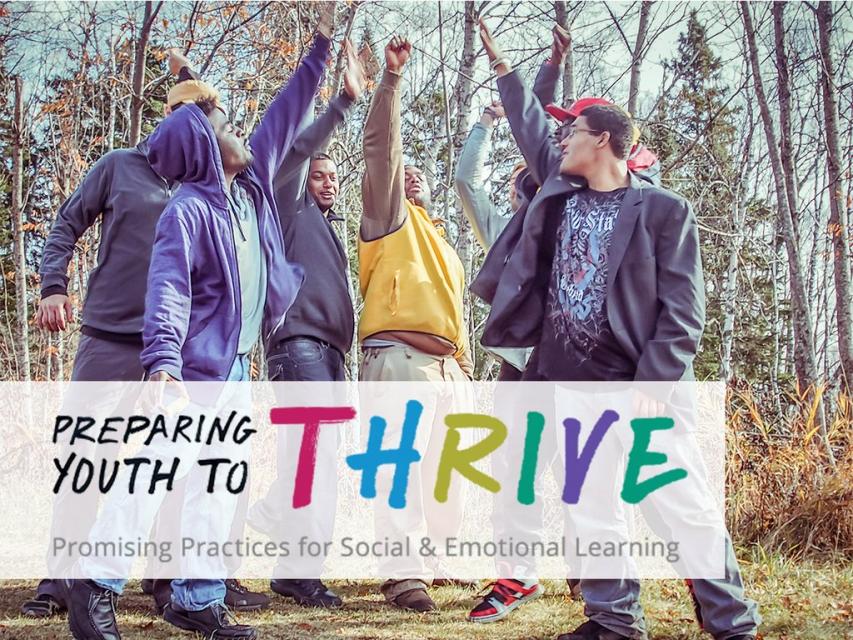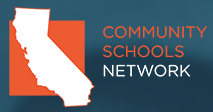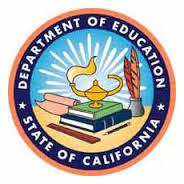CAN Newsletter – February 9, 2016
Related Content
Reminder: Inform Efforts to Increase After School Funding by Taking 5-minute Surey
If you are an after school practitioner in California you have an opportunity to take a five minute survey by February 29, 2016. Survey data will provide information to decision-makers regarding budgetary pressure after school programs currently face.
CDE-EXLD Expanding Student Success Campaign
The California Department of Education’s Expanded Learning Division (CDE-EXD) the launch earlier this year of the Expanding Student Success Campaign; a statewide, public awareness campaign to build support for before and after school programs among K-12 educators and leaders. The campaign features resources and brief videos that highlight the importance of of K-12 expanded learning partnerships to advance student achievement, engagement, and success. The campaign also features resources highlighting the benefits of expanded learning programs to participants and families. The Expanding Student Success Campaign is a strategy to advance the K-12 integration initiative of the Vision for Expanded Learning in California (strategic plan).
CDE-EXLD Site-Level CQI Planning Tool and Resources
To assist programs with meeting the statutory requirement that all ASES and 21st CCLC programs engage in a continuous data-driven quality improvement process [set forth in EC 8484 (a)(2)], the California Department of Education’s Expanded Learning Division (CDE-EXLD), has developed a Quality Program Improvement Tool template and user guide as a compliment to the Department’s Guidance for Developing and Implementing a Quality Improvement Process.
Using Data Analytics to Deliver Better Outcomes for Youth
Every child deserves the chance to succeed in school, work and life. But it’s often the most disadvantaged youth that get the least help as they try to navigate the muddied waters of multifaceted systems. So what can communities do to help? The American Public Health Service Association and Government Technology magazines both ran a recent article by Gary Glickman of Accenture and Elizabeth Gaines of the Forum for Youth Investment entitled Connect the Dots: How Analytics Can Reveal a Big Picture View of At-Risk Youth, and the Service Mix That Can Help Them. The article highlights some of the ways that organizations and communities can aggregate and use data to assess, predict and deliver on the right service mix for disconnected youth.
Preparing Youth to Thrive: Promising Practice for Social & Emotional Learning
Preparing Youth to Thrive: Promising Practices for
Social and Emotional Learning is a recently released field
guide outlining promising practices to advance Social and
Emotional Learning from successful youth programs. The document
outlines strategies implemented by eight unique programs in seven
cities that have a proven track-record of positive impacts for
high-risk adolescent youth. The document is a summary of an
extensive research process that included interviews, site visits,
evaluations, convenings, and surveys. The document outlines
that with the right staff practices, supports, and
curriculum, youth participants develop social and emotional
skills.
Supporting Students Through Partnering With Family Resource Centers
Partnership with Family Resource Centers can leverage an array of resources and supports for students and their families. There are thousands of Family Resource Centers already working in communities across California, ready to help schools serve students and their families. The California Community Schools Network recently released a new chapter (in their LCFF Guide to Student Supports) entitled, Why Family Resource Centers Matter. The chapter outlines promising practices for partnership with family resource centers. A recent blog post by Fiona Lavelle of the California Family Resource Association highlights an example of a powerful partnership between a school district and a Family Resource Center.
State School Chief Tom Torlakson Seeks Sponsors for Summer Meal Programs
In a recent CDE press release, California Superintendent of Public Instruction, Tom Torlakson urged agencies to become summer food sponsors. The Summer Meal Programs are federally-funded programs that reimburse sponsors administrative and operational costs for providing meals to children 18 years of age and younger when they are out of school for fifteen (15) or more consecutive school days. The program is designed to fill the gap for low-income children who might otherwise go hungry during the summer months. Once approved by the state agency, sponsors will select program eligible locations where children are fed and kept safe for the duration of the meal service time. This program is administered by the Nutrition Services Division of the California Department of Education. Learn more about the Summer Meal Program.
Reminder: ASES Universal and Renewal Request for Applications Due Feb. 12
The California Department of Education Afterschool Division released a Request for Applications for After School Education and Safety (ASES) Universal and Renewal grants. Approximately $4 million in funding is available for ASES Universal grants. The remaining funds are obligated for on-going grants funded via the Renewal application. The Renewal application is for existing grant recipients in Renewal Cycle A who wish to continue funding at existing levels. The Universal application is for new applicants and for existing grant recipients who wish to increase funding. Agencies that wish to be considered for funding in 2016-2017 must submit new applications. All applications are due February 12, 2016. Access the ASES applications

